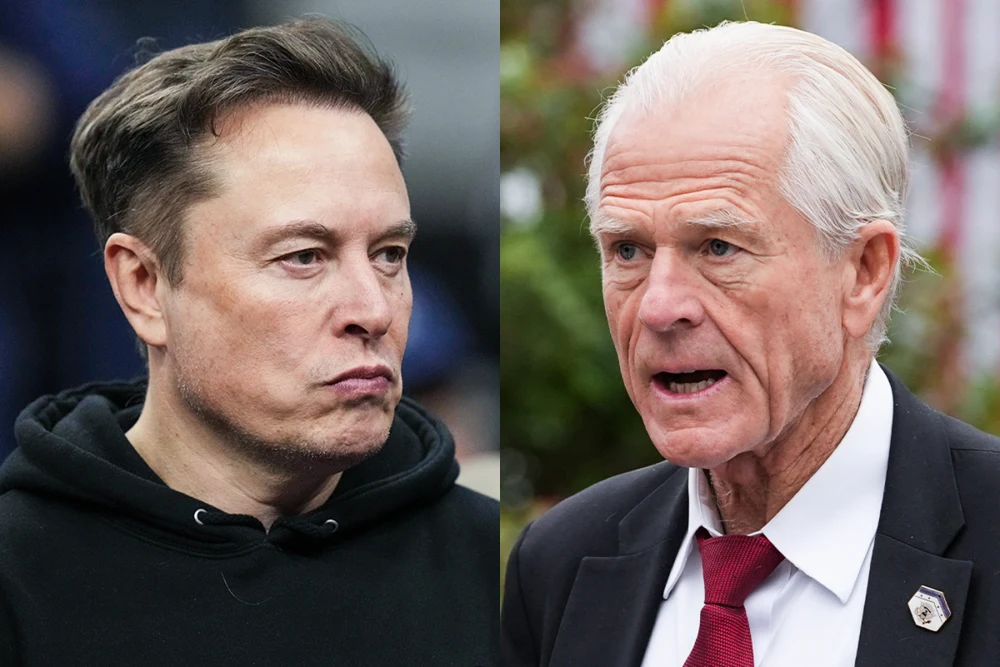
Trump advisers Elon Musk and Peter Navarro have disagreed over the Trump administration’s imposition of trade barriers.
Top White House trade adviser Peter Navarro denied Sunday that there are tensions between him and tech mogul Elon Musk, another senior Trump adviser, days after Musk called Navarro a “moron.”
“Everything’s fine with Elon,” Navarro said on NBC News’ “Meet the Press,” adding with a laugh, “I’ve been called worse.”
Navarro addressed his public spat with Musk in a wide-ranging interview about the state of the economy and stock market in the days after President Donald Trump imposed, and then temporarily reduced, sweeping tariffs on U.S. trading partners.
CNBC asked Navarro in an interview last week about Musk’s stated support for reducing barriers to trade, revealing apparent differences within the administration over Trump’s tariff plan.
“We all understand in the White House, and the American people understand, that Elon’s a car manufacturer,” Navarro said in the interview. “But he’s not a car manufacturer; he’s a car assembler in many cases.”
Navarro said Musk imports parts for the cars that Tesla makes from Japan, China and Taiwan.
“The difference is, in our thinking and Elon’s on this, is that we want the tires made in Akron,” Navarro added. “We want the transmissions made in Indianapolis. We want the engines made in Flint and Saginaw. And we want the cars manufactured here.”
The CNBC interview Monday prompted Musk to criticize Navarro in a series of posts on X. He first called Navarro a “moron” and added that Tesla “has the most American-made cars. Navarro is dumber than a sack of bricks.” He followed that with a sarcastic apology, saying the comparison was “so unfair to bricks.”
On Sunday, Navarro laughed off reports of tensions between the two men, telling “Meet the Press” moderator Kristen Welker: “Elon and I are agreeing. It’s not an issue.”
He also praised Musk’s work with the so-called Department of Government Efficiency, an initiative that has led the Trump administration’s efforts to lay off thousands of workers in the federal government as part of broader stated goal of targeting “waste, fraud and abuse.”
“Elon is doing a very good job with his team with waste, fraud and abuse,” Navarro said, echoing what he told CNBC. “That’s a tremendous contribution to America.”
Since Trump announced details of his tariffs at the start of April, Musk has broken with the administration, saying last weekend that he’d like to see a “zero tariff situation” between the United States and Europe.
Then, on Wednesday, Trump temporarily delayed the bulk of reciprocal tariffs he is planning, keeping 10% duties on most nations’ goods for 90 days while the administration works on reaching agreements with trading partners.
Navarro on Sunday defended Trump’s original decision to issue steep hikes on tariffs and his limited reversal this week, saying the temporary reduction has made way for negotiations.
“This is unfolding exactly like we thought it would, in a dominant scenario,” he said, adding later: “We’ve got 90 deals in 90 days possibly pending here, and it was par for the course. Actually, it was a birdie for President Trump to do exactly what he did, which was pause for 90 days, and we’re going to get this done for the American people.”
When Trump temporarily reduced a majority of the tariffs last week, he wrote on social media that 75 countries had approached the United States looking to negotiate trade deals.
Asked Sunday which countries were in negotiations with the United States, Navarro didn’t provide a number, but he listed the United Kingdom, the European Union, India, Japan, South Korea and Israel as some of the candidates “lining up outside the door of Jamieson Greer,” the U.S. trade representative.
One country Navarro didn’t name is China, which the United States has hit with even more tariffs, totaling 145%. Beijing has responded by raising retaliatory tariffs on the United States to 125%. Asked whether the Trump administration is talking to China, Navarro told Welker, “We have opened up our invitation to them,” and accused it of killing people with fentanyl and taking American factories and jobs.
Navarro also addressed the tariff exemptions the United States issued last week on certain electronics like smartphones and computers, saying they were targeted because they contain microchips — although he didn’t agree that they were being exempted.
“What we’re doing with chips — a problem, interestingly, for chips, because it’s very complex stuff — is that we don’t buy a lot of chips, like in bags. We buy them in products,” Navarro said. “So what Secretary of Commerce Howard Lutnick is going to do — is doing it as we speak — is an investigation of the chip supply chain. The goal is stability and resilience, and you will see actions taken based on those investigations.”
Lutnick addressed the move in a separate interview Sunday on ABC News’ “This Week,” signaling that the exemption from reciprocal tariffs on those electronics was only temporary and that a new round of duties targeting semiconductor chips would be coming.
“All those products are going to come under semiconductors, and they’re going to have a special-focus type of tariff to make sure that those products get reshored,” Lutnick said, adding later: “So what Trump’s doing is he’s saying they’re exempt from the reciprocal tariffs, but they’re included in the semiconductor tariffs, which are coming in probably a month or two. So these are coming soon.”


